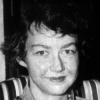Flannery O'Connor

Flannery O'Connor
Mary Flannery O'Connorwas an American writer and essayist. An important voice in American literature, she wrote two novels and 32 short stories, as well as a number of reviews and commentaries. She was a Southern writer who often wrote in a Southern Gothic style and relied heavily on regional settings and grotesque characters. Her writing also reflected her own Roman Catholic faith and frequently examined questions of morality and ethics. Her posthumously-compiled Complete Stories won the 1972 U.S. National Book...
NationalityAmerican
ProfessionNovelist
Date of Birth25 March 1925
CitySavannah, GA
CountryUnited States of America
Even in the life of a Christian, faith rises and falls like the tides of an invisible sea. It's there, even when he can't see it or feel it, if he wants it to be there. You realize, I think, that it is more valuable, more mysterious, altogether more immense than anything you can learn or decide upon It will keep you free - not free to do anything you please, but free to be formed by something larger than your own intellect or the intellects around you.
I don't think you should write something as long as a novel around anything that is not of the gravest concern to you and everybody else and for me this is always the conflict between an attraction for the Holy and the disbelief in it that we breathe in with the air of the times.
On the subject of the feminist business, I just never think...of qualities which are specifically feminine or masculine. I suppose I divide people into two classes: the Irksome and the Non-Irksome without regard to sex. Yes and there are the Medium Irksome and the Rare Irksome.
I write because I don't know what I think until I read what I say.
The only way, I think, to learn to write short stories is to write them, and then try to discover what you have done.
Purity strikes me as the most mysterious of the virtues and the more I think about it the less I know about it.
Faith comes and goes. It rises and falls like the tides of an invisible ocean. If it is presumptuous to think that faith will stay with you forever, it is just as presumptuous to think that unbelief will.
What people don’t realize is how much religion costs. They think faith is a big electric blanket, when of course it is the cross.
All my stories are about the action of grace on a character who is not very willing to support it, but most people think of these stories as hard, hopeless and brutal.
...I have to write to discover what I am doing. Like the old lady, I don't know so well what I think until I see what I say; then I have to say it again.
In the first place you can be so absolutely honest and so absolutely wrong at the same time that I think it is better to be a combination of cautious and polite
I don't think literature would be possible in a determined world. We might go through the motions but the heart would be out of it. Nobody could then 'smile darkly and ignore the howls.' Even if there were no Church to teach me this, writing two novels would do it. I think the more you write, the less inclined you will be to rely on theories like determinism. Mystery isn't something that is gradually evaporating. It grows along with knowledge.
I think it is safe to say that while the South is hardly Christ-centered, it is most certainly Christ-haunted.
Doctors always think anybody doing something they aren't is a quack; also they think all patients are idiots.